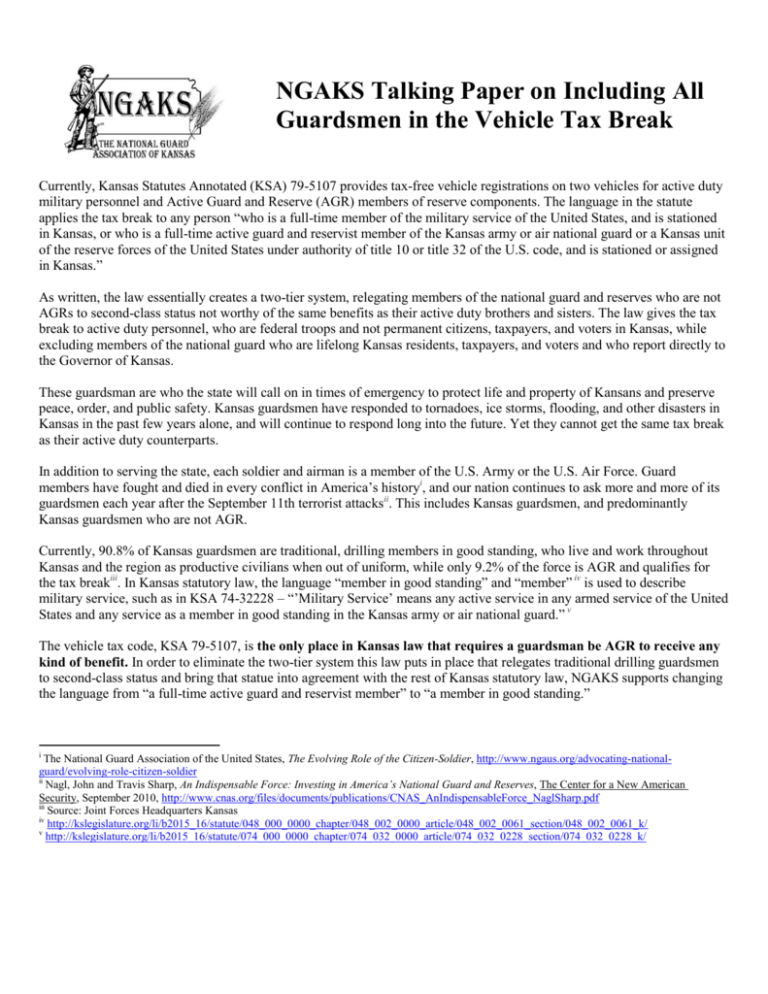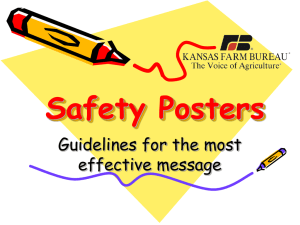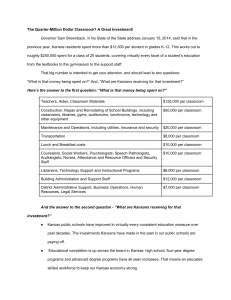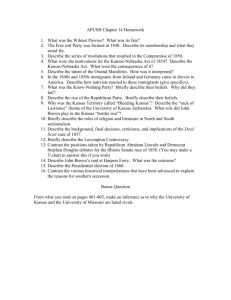NGAKS Talking Paper on Including All Guardsmen in the Vehicle
advertisement

NGAKS Talking Paper on Including All Guardsmen in the Vehicle Tax Break Currently, Kansas Statutes Annotated (KSA) 79-5107 provides tax-free vehicle registrations on two vehicles for active duty military personnel and Active Guard and Reserve (AGR) members of reserve components. The language in the statute applies the tax break to any person “who is a full-time member of the military service of the United States, and is stationed in Kansas, or who is a full-time active guard and reservist member of the Kansas army or air national guard or a Kansas unit of the reserve forces of the United States under authority of title 10 or title 32 of the U.S. code, and is stationed or assigned in Kansas.” As written, the law essentially creates a two-tier system, relegating members of the national guard and reserves who are not AGRs to second-class status not worthy of the same benefits as their active duty brothers and sisters. The law gives the tax break to active duty personnel, who are federal troops and not permanent citizens, taxpayers, and voters in Kansas, while excluding members of the national guard who are lifelong Kansas residents, taxpayers, and voters and who report directly to the Governor of Kansas. These guardsman are who the state will call on in times of emergency to protect life and property of Kansans and preserve peace, order, and public safety. Kansas guardsmen have responded to tornadoes, ice storms, flooding, and other disasters in Kansas in the past few years alone, and will continue to respond long into the future. Yet they cannot get the same tax break as their active duty counterparts. In addition to serving the state, each soldier and airman is a member of the U.S. Army or the U.S. Air Force. Guard members have fought and died in every conflict in America’s historyi, and our nation continues to ask more and more of its guardsmen each year after the September 11th terrorist attacksii. This includes Kansas guardsmen, and predominantly Kansas guardsmen who are not AGR. Currently, 90.8% of Kansas guardsmen are traditional, drilling members in good standing, who live and work throughout Kansas and the region as productive civilians when out of uniform, while only 9.2% of the force is AGR and qualifies for the tax breakiii. In Kansas statutory law, the language “member in good standing” and “member” iv is used to describe military service, such as in KSA 74-32228 – “’Military Service’ means any active service in any armed service of the United States and any service as a member in good standing in the Kansas army or air national guard.” v The vehicle tax code, KSA 79-5107, is the only place in Kansas law that requires a guardsman be AGR to receive any kind of benefit. In order to eliminate the two-tier system this law puts in place that relegates traditional drilling guardsmen to second-class status and bring that statue into agreement with the rest of Kansas statutory law, NGAKS supports changing the language from “a full-time active guard and reservist member” to “a member in good standing.” i The National Guard Association of the United States, The Evolving Role of the Citizen-Soldier, http://www.ngaus.org/advocating-nationalguard/evolving-role-citizen-soldier ii Nagl, John and Travis Sharp, An Indispensable Force: Investing in America’s National Guard and Reserves, The Center for a New American Security, September 2010, http://www.cnas.org/files/documents/publications/CNAS_AnIndispensableForce_NaglSharp.pdf iii Source: Joint Forces Headquarters Kansas iv http://kslegislature.org/li/b2015_16/statute/048_000_0000_chapter/048_002_0000_article/048_002_0061_section/048_002_0061_k/ v http://kslegislature.org/li/b2015_16/statute/074_000_0000_chapter/074_032_0000_article/074_032_0228_section/074_032_0228_k/






